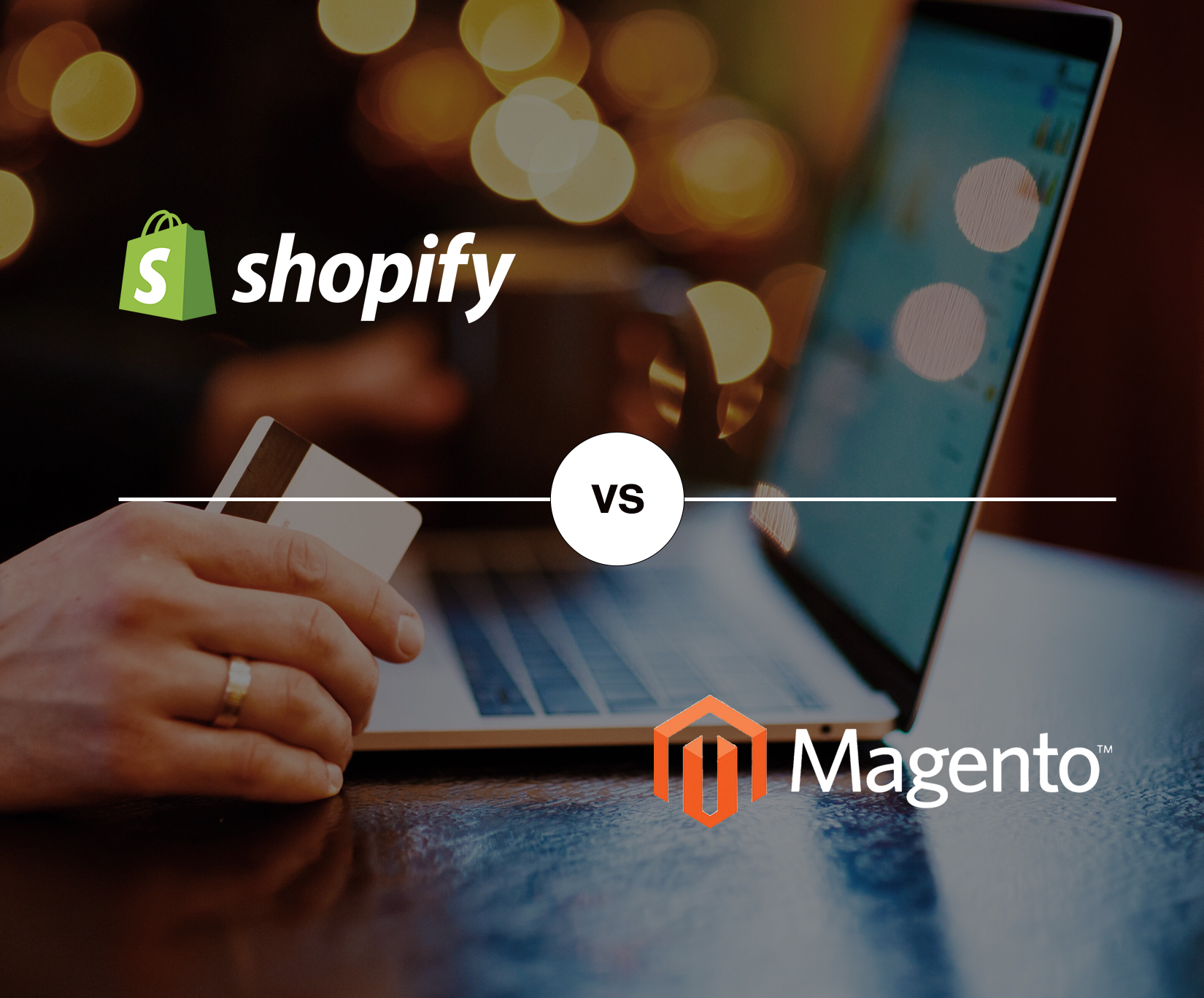From choosing the right e-commerce platform, you either make or break an online business. For startups that want to launch quickly or established names looking for customization and control, it all boils down to the great Shopify vs Magento test. Sometimes, business owners struggle with finding out the difference between Shopify and Magento, as both have their unique merits. This detailed Shopify vs Magento comparison will thus help you decide what is right for you based on your business needs and budget, as well as your expertise.

Quick Overview: Shopify vs Magento
Before delving deep into a proper comparison between Magento and Shopify, one must get a quick look at both platforms. Shopify is a cloud-based SaaS platform founded in 2006. It is designed to be easy to use and quick to set up. It is suitable for small to medium-sized businesses that cannot afford any glitches in technicalities.
On the other hand, Magento is an open-source platform launched in 2008. It is preferred primarily by bigger outlets because of the flexibility, control, and scalability it offers. The ongoing Shopify and Magento comparison actually shows how both platforms cater to different sectors of the e-commerce world.
What is Shopify?
Shopify is a fully hosted e-commerce solution designed to make online selling easy for anyone, even beginners. Being a cloud-based platform, it takes care of all server maintenance, hosting, and security issues. With its pre-built themes, drag-and-drop toolkit, and the large app store of Shopify, you can have your professional online store up and running in mere hours instead of weeks. And this ease of use is what gets Shopify a winning mention in the comparisons of Shopify vs Magento.
What is Magento?
Magento, or Adobe Commerce as it’s sometimes called, is an open-source e-commerce platform designed for businesses that want absolute control over their website’s functionality. Unlike Shopify, Magento is a self-hosted solution unless you go for Adobe Commerce Cloud, and this means developers will generally be involved during setup and customization. In your top priorities are flexibility, deep customization, and scalability, it’s quite an aggressive contender in the difference between Shopify and Magento.
Shopify vs Magento: Core Features Comparison
Here’s a well-structured comparison between Magento and Shopify with respect to key e-commerce features:
| Feature | Shopify | Magento |
|---|---|---|
| Product Catalog | Easy to use, limited complexity | Highly customizable, supports large and complex catalogs |
| Promotion Tools | Built-in tools and extensive app store | Advanced capabilities, but requires more manual setup |
| SEO | Good out of the box | Fully customizable for deep optimization |
| Analytics | Integrated dashboard with basic insights | Detailed and customizable reporting tools |
Summary Insight:
Both Shopify and Magento offer robust core functionalities. However, the difference becomes prominent when it comes to scalability and level of control:
- Shopify is ideal for users seeking simplicity, speed, and managed services.
- Magento is better suited for businesses needing extensive customization and enterprise-level scalability
Magento vs Shopify: Ease of Use
The focus on Shopify remains simple. Any store owner can use such an intuitive dashboard to add products, process orders, or run marketing campaigns. Magento, on the contrary, continues with a greater degree of difficulty. It was always a platform for developers and required a higher technical know-how to set up, maintain, and customize. For anybody getting started or who isn’t technically inclined, Shopify was the obvious choice. So, in this aspect of the Shopify vs Magento comparison, Shopify holds an edge.
Shopify vs Magento: Customization & Design Flexibility
When talking about Magento or Shopify for ecommerce customization, Magento gives you complete control at the code level. You can create an extremely customised shopping experience with backend control. Shopify, on the other hand, offers beautiful themes and app integrations but does not provide code-level control unless you opt for Shopify Plus. Hence, this aspect of the Magento vs. Shopify debate should be of paramount importance if your business places a premium on design freedom.
Development & Coding: Technical Requirements
This necessitates strong developer intervention from installation and customization to update, if one were to put it based on Magento. Being open source is both an advantage and a disadvantage. Shopify is a plug-and-play solution, so easy that even folks with no coding knowledge can put together an elegant-looking site in no time. In general terms, although the two might intersect at some points, the technical differences are that Shopify is for beginners, whilst Magento demands the use of a developer.
Shopify vs Magento: Pricing Breakdown
Shopify offers different monthly plans on a tiered basis-from basic to advanced. Server costs, development charges, and maintenance expenses are to be paid on the side, as Magento is self-hosted. Furthermore, most of the Shopify apps have monthly fees, whereas Magento extensions can be a one-time purchase, costing money for integration. The focus should be on the total cost of ownership (TCO) when making a decision as to choose Magento or Shopify for e-commerce.
Magento vs Shopify: SEO Capabilities
With SEO in mind, both platforms give ways to do SEO in one way or another. Magento gives deep customization to URL, meta tags, and site structure. Hence, it is a highly qualified candidate for the best ecommerce platform for seo. Shopify does come with SEO features out of the box, but does lacks some options on backend control. Hence, for acceptance that heavily relies on organic traffic, Magento might give extra flexibility.
Shopify vs Magento: Security & Compliance
Security is something that can never be sacrificed by an online store. Shopify is built with PCI compliance from the ground up and also offers free SSL certificates. Being self-hosted, Magento needs security patches applied manually, firewalls set up at the hosting level, and its ongoing monitoring. In the Shopify versus Magento comparison, Shopify holds the upper hand when it comes to offering out-of-the-box security for non-technical users.
Plugins, Apps & Integrations
Thousands of ready-to-use apps for marketing, logistics, etc., are made available through Shopify’s App Store. Magento Marketplace has its own set of extensions, but mostly requires technical integration. Another way of describing the difference between Magento vs Shopify would be focusing on ease and customization.
Shopify vs Magento: Support & Community
There is customer support via chat, email, or phone for Shopify users. Magento users tend to rely mostly on community forums, developer channels, and third-party Magento professionals. Adobe Commerce (that is to say, the paid version of Magento) does offer premium support. Such a difference in support plays an important role for those businesses that need hands-on customer care.
International Selling: Multi-Currency & Multi-Language
The Shopify platform has built-in multi-language support, and it can accept multiple currencies with apps and Shopify Payments. Magento, on the other hand, offers much more flexibility with its native multi-language and multi-currency support, ideally suited for complex international operations.
CMS & Content Control
Magento offers a full-featured content management system that tightly controls pages, blogs, and landing pages. Shopify’s CMS is simpler, designed with product-focused sites in mind. Comparisons between Shopify vs WordPress, WordPress vs Webflow, or even Drupal vs WordPress largely favor Magento due to the depth of DNS provided by an e-commerce CMS.
Shopify: Pros & Cons
Pros
- Easy setup and use
- Great for small to medium businesses
Cons
- Limited backend customization
- Extra app costs for advanced facilities
Magento: Pros & Cons
Pros
- Highly customizable and flexible
- Scalable for large enterprises
Cons
- Developer expertise is required
- High cost of hosting and maintenance
Shopify vs Magento: Business Use Case Scenarios
For new startups and the ever-present Small Businesses who are working with tight budgets and less tech-based knowledge, Shopify is the optimal choice. Speed, simplicity, and level-based scalability are its trademarks. Enterprises at a large scale with complex requirements and an IT team, on the other hand, have sheer control and customization provided by Magento. This Shopify vs Magento comparison draws attention to the fact that choosing is a step toward your business model.
Final Verdict: Magento vs Shopify – Which Should You Choose?
With a Shopify shop, you are looking at ease of use against flexibility with Magento. Shopify wins on the grounds of user friendliness, speed, and front-line support. Magento shines in areas like customization, scalability, and SEO flexibility. No straight answer can be given to the question of Magento vs Shopify. Consider your company’s size, resources, budget, and long-term goals before deciding.
For such helpful content, you should connect with a GTECH, one of the finest web development agency in Dubai, UAE.
FAQs: Shopify vs. Magento
What’s the main thing that separates Shopify from Magento?
The chief difference between Shopify and Magento is that Shopify is a hosted, beginner-friendly SaaS platform, while Magento is a self-hosted, customizable open-source solution.
Which Largely stores better?
Being very customizable and highly scalable, Magento lends itself to large-scale stores.
Which one is more beginner-friendly?
Shopify is the more beginner-friendly of the two, catering to the smaller businesses and first-time e-commerce entrepreneurs.
Which is better for selling internationally?
Magento certainly does have a better array of options for internationalization, but Shopify can also be forced to sell all over the world through apps.
Related Post
Publications, Insights & News from GTECH








